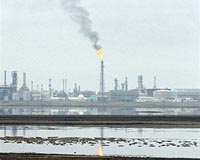 |
Lagos, Nigeria (UPI) Jan 28, 2009 West Africa's oil boom has brought immense wealth and political upheaval to the region, and a new peril -- pirates and criminal gangs who prey on the black gold that could transform a long-ignored part of the world. The maritime marauders have not yet achieved the global notoriety of their brethren operating off Somalia, on the other side of the continent, but they have been building a fearsome reputation for some time and causing a growing problem for the region's burgeoning oil industry. On Jan. 5 Nigerian pirates stormed a Panamanian-flagged Ukrainian tanker, the Westaf, anchored off Lagos, Nigeria's commercial capital, according to the Sovfracht Maritime Bulletin published in Kiev. They robbed the crew, shooting and wounding the captain and six of his men. The Westhaf, built in 1986, is used as a floating storage and processing terminal. On Nov. 23 pirates, probably Nigerian, hijacked the Liberian-flagged oil tanker Cancale Star 18 miles off the coast of Benin, a tiny country that is Nigeria's western neighbor, and 24 miles southwest of Lagos. It was the first known hijacking in Benin waters and it underlined how the piracy problem is spreading in the Gulf of Guinea and along the Atlantic seaboard as the oil boom expands. Most of the piracy still occurs off Nigeria's oil-rich Niger Delta. On Jan. 15 the International Maritime Bureau's piracy reporting center in Kuala Lumpur, Malaysia, classified the waters off Nigeria as "very dangerous." IMB Director Pottengal Mukundan noted: "The attacks in Nigerian waters are frequently much more violent in nature than those off Somalia. The incidence of violent attacks against ships' crews has also spilled over into neighboring states." The bureau reported that 28 attacks were logged in 2009 compared with 40 a year earlier. But shipping sources suggested that there were another 30 attacks last year that went unreported. Most were related to the oil industry. In the Niger Delta, the marauders in armed speedboats attack tankers and work with militants in the delta's swamplands who steal around 150,000 barrels a day from oil installations or pipelines -- around 5 percent of Nigeria's daily production -- in an illegal trade known as "bunkering." This highly organized trade has become so big in the delta that the gangs have to use rogue tankers to spirit the crude away for refining abroad. One tanker, the Russian-registered African Pride, was intercepted by the Nigerian navy in the Gulf of Guinea in October 2003 with 11,300 tons of stolen crude aboard. In May 2004 a Nigerian navy patrol boat killed 17 pirates in a gun battle in the creeks and swamps west of the port of Warri, the heart of Nigeria's oil industry. One of the main problems facing shipping off West Africa is the lack of naval protection. The Nigerian navy's successes against the pirates are the exception rather than the rule. The pirates, able to buy heavy weapons with the proceeds from their plundering, often have more firepower than the patrol ships they encounter. The U.S., British and French navies have recently been conducting joint exercises with regional forces. But there is nothing to compare with the international naval task force deployed in the Gulf of Aden to counter the Somali pirates. There is little real coordination by the governments of West Africa, a region notorious for political upheaval, coups, corruption and inefficient, poorly armed military services, to combat the problem. But that may be changing. In recent years the U.S. Navy has handed over half a dozen upgraded patrol boats to the Nigerian navy to boost its capabilities. The inauguration of the U.S. Africa Command, known as Africom, on Oct. 1, 2008, to coordinate U.S. military missions across the continent, train African forces and combat terrorism, may bolster efforts to crack down on the pirates. That will undoubtedly take time. Africom, still headquartered in Stuttgart, Germany, is already finding itself stretched. But West Africa is becoming an important source of oil for the United States. By 2015 the region, including Angola, Africa's top producer, and the Congo, is expected to be supplying 25 percent of U.S. oil imports, greatly reducing American dependence on the Middle East. All that oil will be carried directly across the Atlantic in tankers that will be increasingly at risk in West African waters.
Share This Article With Planet Earth
Related Links Powering The World in the 21st Century at Energy-Daily.com
 Chinese-led group formally signs Iraq oil deal
Chinese-led group formally signs Iraq oil dealBeijing (AFP) Jan 28, 2010 A consortium led by oil giant PetroChina has formally signed a 20-year deal with Iraq to develop the Halfaya oil field, as China boost its presence in the crude-rich region. PetroChina, France's Total, Malaysia's Petronas and Iraq's South Oil will develop the field in southern Iraq, which has proven reserves of about 4.1 billion barrels, the Chinese company said in a statement late Wednesday ... read more |
|
| The content herein, unless otherwise known to be public domain, are Copyright 1995-2009 - SpaceDaily. AFP and UPI Wire Stories are copyright Agence France-Presse and United Press International. ESA Portal Reports are copyright European Space Agency. All NASA sourced material is public domain. Additional copyrights may apply in whole or part to other bona fide parties. Advertising does not imply endorsement,agreement or approval of any opinions, statements or information provided by SpaceDaily on any Web page published or hosted by SpaceDaily. Privacy Statement |